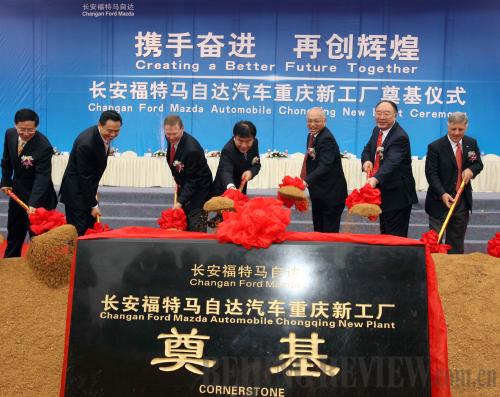|
 |
|
A GOOD HOME FOR INVESTMENT: A ground-breaking ceremony is held for the Chang'an Ford Mazda Automobile Chongqing Plant on September 25, 2009 (YUAN MAN) |
For the past few years, China has topped the list of U.S. management consulting firm A.T. Kearney's Foreign Direct Investment Confidence Index. On January 25, the consulting firm issued its latest index, which showed China was still the world's most attractive investment destination.
A.T. Kearney issues a report every year on global investment flows. Analyzing opinions from presidents of 1,000 major multinational companies throughout the world, the report is commonly recognized by the international community as an indicator of comprehensive attraction of investment environments in various countries.
In 2009, some foreign companies withdrew from China's coastal areas, causing some people to worry China would be less appealing to foreign investors. The A.T. Kearney report indicates such worries are unnecessary.
In fact, China's appeal to foreign investment is not declining. According to figures released by the United Nations Conference on Trade and Development on January 19, 2010, the paid-in capital in China reached $90.03 billion in 2009, a decline of only 2.6 percent, while the paid-in capital worldwide dropped 39 percent in the same period. In 2009, China ranked second in absorbing foreign investment, just following the Untied States.
"Even under such grave circumstances, there was still $90 billion in foreign investment entering China. What does this mean? It means that the expanding Chinese market is very attractive, that the Chinese investment environment is being improved, and that Chinese legal construction is in progress," said Ma Jiantang, Commissioner of the National Bureau of Statistics (NBS). "I believe that the huge Chinese market and the improved investment environment have great attraction for any company that wants to develop."
Among figures released by the NBS on foreign direct investment (FDI) in 2009, one interesting phenomenon stands out. In January and February 2009, China-attracted FDI decreased 26.2 percent year on year, but in December that year, the paid-in capital soared 103.1 percent from the year before.
Policies in 2010
Although investors will always have their complaints, it is undeniable the Chinese Government has created a good investment environment for foreign investors.
Against the backdrop of FDI decrease throughout the world, Chinese Premier Wen Jiabao held a State Council meeting on December 30, 2009 to implement further measures to attract foreign investment.
According to policymakers at the meeting, foreign-invested companies have become an important part of the national economy and China should create an investment environment that is more open and more optimized.
The meeting put forward five aspects to attract foreign investment in 2010: Revising the Catalogue of Industries for Guiding Foreign Investment so as to expand the fields for opening up; rendering priority land supply to projects in land-intensive industries where foreign investment is encouraged by the country; encouraging foreign investors to participate in reorganizing and transforming domestic enterprises by means of mergers and acquisitions; expanding financial channels in China for foreign-invested companies and guiding financial institutions to further enlarge credit support to foreign-invested companies; and improving the foreign exchange administration of foreign-invested companies and simplifying the settlement proceedings of their foreign exchange capitals.
Yao Jian, spokesman for the Ministry of Commerce (MOFCOM), said the detailed new policies for attracting foreign investment are being researched and formulated. "Attracting foreign investment in various forms is an important part of our research. With a short supply of land resources and accelerated industrial upgrading in China, we believe there will be more and more mergers and acquisitions," he said.
| 